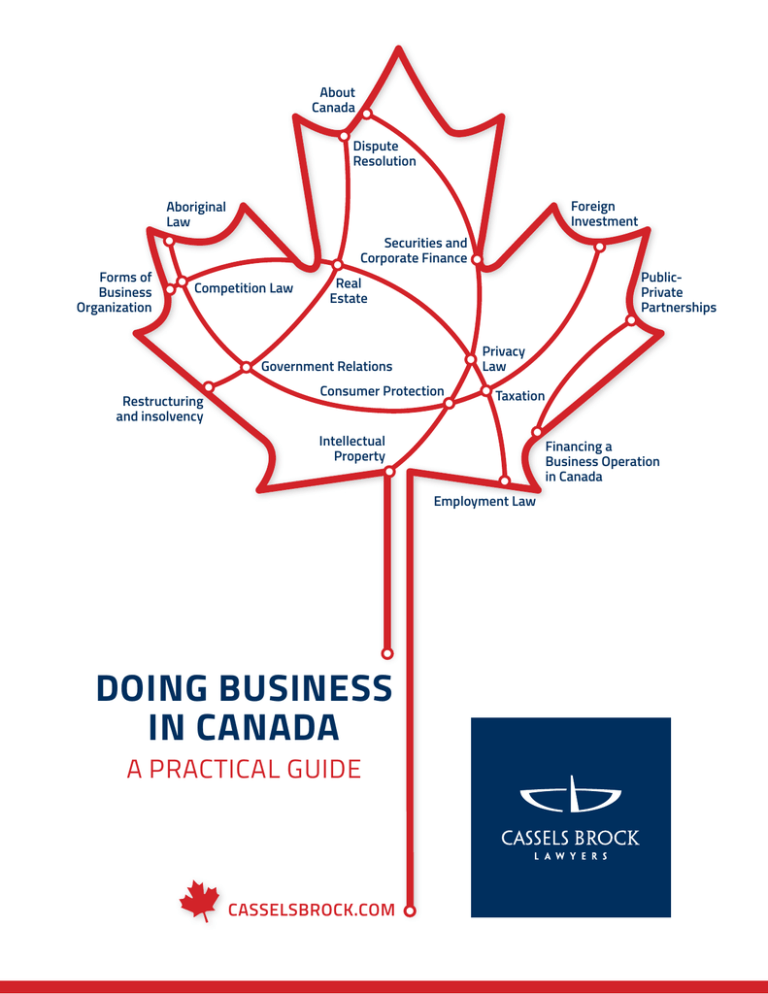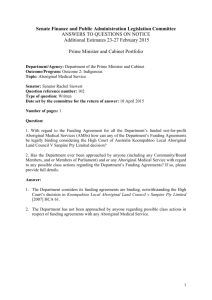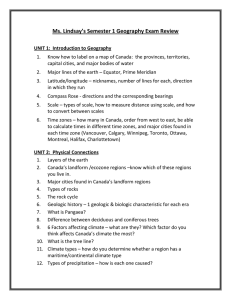about canada Dispute resolution
advertisement

About Canada Dispute Resolution Foreign Investment Aboriginal Law Securities and Corporate Finance Forms of Business Organization Competition Law Privacy Law Government Relations Restructuring and insolvency PublicPrivate Partnerships Real Estate Consumer Protection Taxation Intellectual Property Financing a Business Operation in Canada Employment Law Doing Business In Canada A Practical Guide casselsbrock.com Aboriginal Law Treaty Rights Definitions Consultation and Agreements Recent Legislative Initiatives Doing business in Canada often means dealing with Aboriginal law issues, due to the fact that Aboriginal Peoples in Canada have either unsettled legal claims and rights or court-affirmed legal claims and rights to and on large portions of the country. There are specific claims, which are those claims based on nonfulfillment of treaty obligations or misadministration of Indian monies or lands, and there are comprehensive claims, which are based on traditional land use. Businesses in the natural resources sector — energy, forestry, mining and fishing — are among those most affected by Aboriginal law issues, which naturally arise when developments or activities occur on lands subject to land claims or other Aboriginal or treaty rights. Case law relating to Aboriginal or treaty rights and interests is relatively new and still evolving; as such, awareness of current applicable laws is imperative to the success of a project. Treaty Rights As the Aboriginal and treaty rights of Aboriginal Peoples are recognized and affirmed in Section 35 of the Constitution Act, 1982, both the federal and provincial governments (“the Crown”) are obligated to “act honourably when dealing with Aboriginal Peoples.” This means that potential developments or activities on lands to which Aboriginal Peoples have claims or interests may be subject to a legally required consultation process with the impacted group of Aboriginal Peoples. Specifically, when the Crown is considering whether to make a decision that might adversely affect an Aboriginal or treaty right or interest, the Crown has a duty to consult, and, where appropriate, accommodate Aboriginal Peoples. The duty to consult and accommodate varies on a case-by-case basis, and each project does not require the same degree of consultation or accommodation. As one Crown decision can impact a number of different groups of Aboriginal Peoples with overlapping claims or interests, it is imperative that the consultation and consultation 1.1 Doing Business In Canada: Aboriginal Law records are done properly, and that the relevant Aboriginal groups are meaningfully consulted. Failure to do so can result in, among other things, permits being delayed or challenged, community protests, investor relations problems or litigation for injunctions or damages. Definitions Following are the definitions of “Aboriginal Peoples,” “treaty rights” and “Aboriginal rights” under Canadian law. »» “Aboriginal Peoples” comprise three distinct groups: the First Nations (also known as “Indians,” a historical misnomer that has been nonetheless adopted by many members of this group), the Inuit and the Métis. Canada’s federal Parliament assumed exclusive legislative jurisdiction over “Indians and lands reserved for Indians,” and enacted legislation including the Indian Act and the much more recent First Nations Fiscal Management Act, First Nations Land Management Act and Indian Oil and Gas Act. While First Nations and Inuit are under federal jurisdiction, the relationship between the Métis and Parliament will be determined by the Supreme Court of Canada (“SCC”) in late 2014 if leave is granted on a Federal Court of Appeal ruling from April 2014 that Métis are included in the phrase “Indians and lands reserved for Indians.” »» “Treaty rights” are the rights set out in historic and modern treaties. Much of northern Canada is covered by modern treaties, and a large portion of southern Canada is covered by some form of historic treaty. British Columbia is the only province that remains largely uncovered by treaties. »» “Aboriginal rights” are defined as cultural rights traditionally exercised by Aboriginal Peoples. These rights include the right to hunt, trap, fish and gather on the land in question, if not to the land itself where Aboriginal title is recognized. In June 2014 the SCC upheld the BC Supreme Court’s 2007 decision to recognize Aboriginal title in a broader sense, not just as “specific, intensely used sites”; as a result, both private and public entities are legally required to consult, and where appropriate, accommodate Aboriginal groups. This ruling establishes a precedent that has national implications and will have impacts on resource developments and major projects both within the declared Aboriginal title area as well as within those areas where Aboriginal rights, including title, are being asserted. Consultation and Agreements Although the consultation process with potentially impacted Aboriginal groups is the Crown’s responsibility, the Crown is able to delegate some or all of the process to the project proponents who are seeking its approval to proceed. This is simply because the proponent has assessed the project’s feasibility before applying, has the most current information, and has the most incentive to conduct a successful consultation. It is also routine for both federal and provincial governments to promote impact-benefit agreements, participation agreements or revenue- or tax-sharing agreements between project proponents and the relevant Aboriginal groups. Such agreements are often necessary to ensure that projects can proceed with greater certainty and that the legitimate concerns of the impacted Aboriginal groups are taken care of. Benefits most often brokered in these agreements include employment opportunities, education and training initiatives, and contracting and business opportunities for the impacted communities, as well as capacity-building initiatives and plans to mitigate environmental impacts for the duration of the project and after the project closes. Early and active engagement to explain the impacts of the project — followed by listening to and understanding the relevant Aboriginal group’s specific needs and goals and working out how best to meet them — will result in a successful agreement. It will also assist in approval and Doing Business In Canada: Aboriginal Law1.2 implementation of the project. Most Aboriginal groups are open to development on their lands as long as the community and community members have an opportunity to share in the benefits (in both the short- and long-term) and the lands are protected as well as possible for future generations. This balance is the most important consideration to most communities, so Aboriginal groups will often request third-party heritage and environmental assessments and studies to document the extent of Aboriginal interests and to better articulate the potential impact of proposed projects on these interests. Recent Legislative Initiatives Increasingly, Aboriginal groups are seeking ownership interests and long-term revenues for their communities, and many projects are located on reserve lands. These kinds of projects require efficient tax structures, as there are different types of reserve lands in Canada, and a number of different rules may apply. Further, federal laws do not adequately cover developments on reserve lands and this lack of clarity or certainty could result in problems for all parties. For now, project proponents, governments and Aboriginal groups wishing to get around this unclear or grey area in federal law are using the more recent legislative initiatives like the First Nations Commercial and Industrial Development Act, which was established in 2005 at the request of First Nations themselves. This Act was designed to address the “regulatory gap” that existed for large-scale developments that were planned or that were taking place on reserves under the Indian Act. It is expected that further developments such as increased use of the newer federal legislation dealing with more complex land development on reserve lands will assist all parties in developing more stable and responsive regulatory regimes to manage the increasingly more complex projects. These are just some of the more recent laws and general considerations for doing business in Canada. The bottom line is that to avoid project delays or problems, businesses require experienced legal counsel to guide them through the consultation and approval process, and to assist them with identifying and maximizing the potential for positive shared outcomes for these developments. 1.3 Doing Business In Canada: Aboriginal Law About Canada Dispute Resolution Foreign Investment Aboriginal Law About Cassels Brock »» Canadian law firm of more than 200 lawyers based in Toronto and Vancouver focused on serving the transaction, advocacy and advisory needs of the country’s most dynamic business sectors »» Emphasis on core practice areas of mergers and acquisitions, securities, finance, corporate and commercial law, taxation, intellectual property and information technology, international business and government relations Securities and Corporate Finance Forms of Business Organization Competition Law Restructuring and insolvency Consumer Protection casselsbrock.com/DBIC Financing a Business Operation in Canada Employment Law »» Cited as market leaders by Chambers Global, ALM 500, Best Lawyers, Lexpert, Global Counsel and others »» Serving leadership roles in business, political, civic, charitable and cultural organizations in community, national and international organizations Taxation Intellectual Property »» Consistently ranked at or near the top of Bloomberg, Thomson Financial and MergerMarket deals league tables for mergers and acquisitions and equity offerings »» Dedicated to staying on the leading edge of trends in law and business to offer timely proactive and preventative advice that adds demonstrable value Privacy Law Government Relations »» One of the largest business law practices in Canada, serving multinational, national and mid-market entities »» Regularly act on deals honored at the Canadian Dealmakers’ Gala and for counsel recognized at the Canadian General Counsel Awards PublicPrivate Partnerships Real Estate Doing Business In Canada A Practical Guide casselsbrock.com







